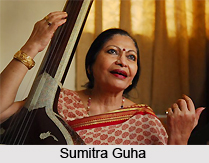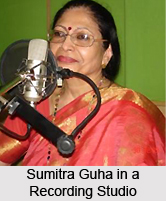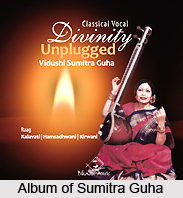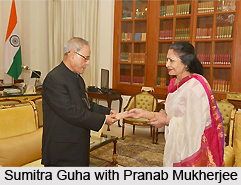 Sumitra Guha is the name that incorporated a rare kind of style to music that delves her audiences into a superb life quality. Through her every execution she always attempted to reflect her dedication to the art form. Experiencing her concert is an experience in its true means. She was born into a culturally rich family. The world of music came to explore in front of her with the hands of her mother. For her mother music was an avenue to reach God.
Sumitra Guha is the name that incorporated a rare kind of style to music that delves her audiences into a superb life quality. Through her every execution she always attempted to reflect her dedication to the art form. Experiencing her concert is an experience in its true means. She was born into a culturally rich family. The world of music came to explore in front of her with the hands of her mother. For her mother music was an avenue to reach God.
Early Life of Sumitra Guha
At the tender age of 11 years, Sumitra Guha started undergoing formal training under the expert tutelage of S. R. Janakiraman (Sangeetha Vidwan). S. R. Janakiraman was a well-appreciated vocalist. Sumitra Guha has learnt the tradition of two schools of Indian classical music, Carnatic and Hindustani tradition. By the time Sumitra Guha specialized in the Carnatic vocal and started instilling the nuances of this tradition.
Education and Training of Sumitra Guha
Sumitra went to Viswa Bharati University in Shantiniketan after finishing her pre-university course. She went to Viswa Bharati University to obtain graduation degree in Philosophy. Apart from studying she started enriching her signing skills into the Hindustani tradition of Music. Hindustani Music holds the refinements of `stability of swaras, the depth of the alaap and the slow elaboration of notes in the Vistaar`. This attracted her to learn the tradition. Under the illustrious Pt. A. Kanan and Vidushi Malavika Kanan in the year 1964, Sumitra Guha started receiving training in Hindustani Classical music. Later on she attempted to instill both the style into her own style of music. The accomplished disciple of Ustad Bade Ghulam Ali Khan, Sushil Kumar Bose later on has given training on this attempt of her.
Personal Life of Sumitra Guha
At the age of 19 years, Sumitra Guha got married. At that time women were not allowed to execute their talent. Sumitra Guhu with all hindrances made her way to continue her passion, love, namely Music. She used to wake up at 4 p.m in the morning for her `Riaaz`. Her husband later on realized that for Sumitra Guhu, music is just not a past time, it is dedication for her. However she got the support of her husband.
Her husband and her father both stood behind her like pillars. As recognition to her extraordinary expertise in the year 1972, she has been included as B-grade artist under the AIR classification. In the year 1995, she obtained the top grade title "Vidushi". In 1982, 1985, 1989 and 1990, Sumitra Guhu performed in chain of concerts for All India Radio. During four Radio Sangeet Sammelans in 1988 (Mathura), 1994 (Bangalore), 1998 (Mumbai) and 2001 (Raipur), her performance was broadcasted live throughout India. In the year 1985, Sumitra made her debut National programme on Doordarshan in 1985, during the Brahmotsav in the year 1972 Sumitra Guha gave her first public performance, at the Thirumala temple in Tirupati. At that performance she has been conferred the gold medal, and since she has never looked back.
 Life in Music for Sumitra Guha
Life in Music for Sumitra Guha
She has participated at the major festivals like Sawai Gandharva Music Festival (Dharwad) in the year 1988; Sawai Gandharva Music Festival (Dharwad) in the year 1990; Malhar Festival (Chandigarh & Lucknow) in the year 1997; in the year 2003 she performed at Spirit of Unity Concerts (Srikakulam), Andhra Music Academy (Hyderabad), Sangeet Natak Akademi Golden Jubilee Celebrations (Hyderabad), Harbhallav Music Festival (Jalandhar), Shivaratri festival (Badohi). In the year 2004, she performed at Prayag Sangeet Sammelan (Allahabad), Malhar Festival (Chandigarh & Lucknow), Shivaratri festival (Badohi); in the year 2005 Theosophical Society (Varanasi), Gandhi Smriti Smarak Samiti (Delhi); in the year 2006 Indira Gandhi Centre for the Performing Arts, Bangiya Sanskriti Sansad (Kolkata), Ballabhacharya Trust (Rakjot).
She has performed her recitals at many temples, which became one of the marked features of her career. In the year 1984, in one such performance she was conferred the gold medal at the All India Vaggeyakar Utsavams at Bhadrachalam. In the year 1991, Dishari, the West Bengal Journalists Association awarded her the honor the Best vocalist of the Year for l990. The Sangeet Kala Kendra, Agra awarded her the Sangeet Kala Ratna at the Vishnu Digambar Samaroh in October in the year 1997. In the year 1995 as an honour on `her evolution as a musician`, Central Production Center made a documentary, called `Ek Mulakat`.
Sumitra Guha has always magnetized her audiences through her performances. She has received acclamation for her performance. The best review that she has fetched in her career has been for her performances at the Vishakha Music Academy in Vishakhaputtnam. The daily `Enadu`, commented on her voice: "Not only human hearts, but stones could also melt". Sumitra Guha for her mastery over both the Hindustani and Carnatic styles has been chosen as one of the artists by the Thirumala Tirupati Devasthanams (TTD) for the Annamacharya project. Andhra Pradesh government has aided this project. Their main aim was to circularize the Sankirtans written by Saint Annamacharya in the fifteenth country throughout the North India. Sumitra Guha was given the responsibility of setting eight of these Sankirtans to tune. She set these Sankirtans drawing from ragas (Malkauns, Hindol, Bhoopali, Todi, Pahari and Bhairavi) in order to accommodate the mood and theme of each composition.
Musical Records for Sumitra Guha
For the Sangeet Natak Academy and the national channels of AIR, Sumitra has recorded her voice. In India the Atlantis Co. and HMV have disseminated her cassettes. In favor of the Indian Archives in New York as well as for the MMY Music foundation, she has also brought out several CDs abroad. She has also executed outside India. Her first execution was in the Indian Embassy in Katmandu in the year 1990. In the year 1993, during the state celebrations of Shivaratri in Mauritius she was sponsored by the ICCR to perform. In the year 1994, her first tour of Europe was patronized by the Maharishi Mahesh Yogi Foundation, which covered Holland, 15 cities in Germany, Switzerland, Hungary, Slovenia and Croatia. She also touched upon Serbia, Yugoslavia. In the same year during the time of October-December, the Maharishi Mahesh Yogi Foundation again sponsored her and she went on a 2-month tour on South-East Asia. She covered Japan, the Philippines, Thailand, Hong Kong and South Korea on this trip.
Foreign Tours for Sumitra Guha
In South Korea she conducted lecture - demonstrations and performed at Jugalbandhis with Korean musicians, besides her own concerts. In the year 1996, Sumitra Guha went on a tour of West Asia, covering main cities in Turkey and 12 in Israel. In the year 1997, she went on her second tour of Europe, covering France, Sweden, Yugoslavia, Holland, Germany, Croatia and Slovenia on a sponsorship from the Maharishi Mahesh Yogi Foundation. In the year 1998, Sumitra went to Fiji to perform for the national festivities during Shivaratri on the invitation of the Mauritian Government. In the year 1999, during October, on a sponsorship of Saraswati Mandiram of Boston, Sumitra Guha went on her first North American tour. She went to Canada, after two concerts in Boston, where she gave performance in Montreal and Toronto. At Fairfield, Iowa, other than carrying concerts, she also gave special lessons in Hindustani Classical Vocal Music to students of the Maharishi University. She also touched upon North Carolina, and San Francisco. She recorded for the Indian Archives in New York before her returning to home.

In the year 2000, Sumitra Guha went for the tour of North America, on an invitation of the Sarod maestro, Ustad Ali Akbar Khan. He privately funded this trip of her. Three concerts to her credit she held in San Francisco, in Houston and in Chicago as well. In the year 2001, with two concerts in Paris this tour started off. From Paris, Sumitra Guha went on to North America. At the South East Missouri State University in Cape Girardeau and at MIT among other venues in Boston she has executed her Gayaki. Sumitra Guha has also exhibited concerts in Fairfield and St. Louis. For the Prana Pratishtha of Lord Vekateshwara in Montreal, she has executed. In the year 2002, she has performed at the India House in Paris. This performance was accompanied by a performance at Alencon on the 26th June. These performances came before two concert workshops. These workshops were conducted at Strasbourg and Tullus on 27th, 28th and 29th of June, and 1st, 2nd and 3rd July in that order. After that she went for the European tour and executed at Lvov, Ukraine and simultaneously gave workshops from 21st July to 30th July. On 1st August she gave her next performance for world peace assembly in hotel Mariton near castle.
Sumitra went to Canada after a booming tour of Europe. On the invitation of the Hindu temple on the occasion of Maha Vishnu Yagna, she exhibited her gayaki at Montreal. She performed at the beginning as well as at the end of the occasion. She also executed in Ottawa at the Sai temple. From 25th August to 28th August, the reasoning out concert and workshop of her tour was at the Boston Art Centre, Capecord. She has also performed at Federation of Indian Association (San Francisco). Sumitra Guha has also exhibited her performances at the Nehru Centre (London), Royal Concert Hall (Glasgow), Royal Concert Hall (Glasgow), Federation of Indian Association/Saikat (San Diego), World Bank (Washington DC), Chhandayan (Washington DC), Malibu Temple (San Diego), Mus‚e Guimet (Paris), Music Festival (Turin), Nantes, Concert and Workshop (Strasbourg) in the respective years of 2003, 2005, 2006.
In the year 2007, she has performed at Millennium Stage, John F Kennedy Center for the Performing Arts, (Washington DC). Apart from these performances she also gave concerts privately at the Universities & Schools of Harvard University, Sakler Museum in the year 2003; Maharishi Vedic Univ. Fairfield, USA in the respective years of 1999, 2001, 2003; Maharishi Vedic Univ., Holland in the respective years of 1994, 1997, 2002; South East Missouri State University in the year 2001; MIT, Boston, USA in the year 2000; University of Massachusetts in the respective years of 2003, 2006; Appeared on several Press Conferences, interviews, Radio & TV in Europe and USA. She has given private concerts at the countries like Algeria, Belgium, Germany, France, Croatia, Yugoslavia, Slovania, Serbia, Holland, Sweden, Ukraine, Russia, West Asia, South East Asia, Nepal, Canada, USA and UK.
In India Sumitra Guha has performed at Bhowanipore Sangeet Sammelan, Calcutta; Shyam Ganguli Music Conference, Calcutta; Alankar Music conference, Calcutta; Kala Mandir, Culcutta; Rabindra Sadan (Kolkata); Mavalankar Hall, New Delhi, for Sai Cultural Association; Marble Palace, Culcutta; Hindi High School Auditorium, Calcutta; Tirumala Temple, Tirupati; Kakirana Cosmopolitian Club, Kakirana; Vishaka Music Academy, Vizag; Lion`s Club, Vijayavada; Kehkasha on the invitation of Kishen Maharaj (Allahabad); Music Academy (Chennai)Music Academy (Chennai); Kanaka Durga Kala Samiti (Vijayawada); Gandharva Mahavidyalaya, New Delhi; Padatik, Calcutta; Bhowanipore Sangeet Sammelan, Calcutta; Birla Academy, Calcutta; All-India, Calcutta; All-India Vaggeyakar Utsavams, Bhadrachalam; Thyagaraja Gana Sabha, Hyderabad; Annamacharya Bhavana Vahini, Hyderabad; India International Centre (organized by Geetika), New Delhi - 1988; India International Centre (organized by Geetika), New Delhi; Invited from Annamacharya Bhavana Vahini, Hyderabad; Annamacharya Bhavana Vahini, Hyderabad; Azad Bhavana, New Delhi, Sponsored by ICCR; India International Center, New Delhi; Kala Mandir, Calcutta; TV Concert in Gnyan Manch (Kolkata); U.P. Sangeet Natak Academy, Lucknow; Mahatma Gandhi Institute of Medical Sciences, Wardha; Vasant Rao Deshpande Auditorium, Nagpur; Performed for Jaipur television before an invited audience; Triveni kala Sangam, New Delhi, for Sahitya kala parishad; Pracheen Kala Kendra, Chandigarh; FICCI auditorium, New Delhi; Kamani auditorium, New Delhi; IIC, New Delhi; Indian National Theatre, Chandigarh; Vishnu Digambar Samaroh Agra; Jhankar Festival, Sahitya, Kala Parishad (Triv); HCL Concert series,
 India Habitat Centre (New Delhi); Bharatiya Sangeeta Programme , Sri-ram Centre for Art & Culture, New Delhi; Kamani, New Delhi for Sumadhur Hansadhwani`s annual function; Sumadhur Hansadhwani`s annual function; Music Education Trust, Chennai; Sahitya Kala Parishad`s Kumar Gandharva Bhakti Sangeet Utsav, N. Delhi; Sriram Centre for Art & Culture; Kamani, New Delhi, for Sumadhur Hansadhwani`s annual function; Sahitya kala Parishad classical music (Sriram Centre); Mahatma Gandhi Seva Mandir, NPCA, Bombay; Sangeet Kala Mauch, Jalandhar; Haridas Sangeet Sammelan (Mumbai); Radio Sangeet Sammelan, Raipur; Kalayatan - Valsad; Saptasur (Kolkata); The Spirit of unity concerts for universal integration , 25th January, Srikakulam; Concerts in Hyderabad academy; Santacruise music circle in Sheila Rakheja hall in Mumbai; Ville Parle Music Circle (Mumbai); Concert in DAV School (NOIDA); Concert in the Divine presence of Bhagwaan Sri Sathya Sai Baba; HCL Concert series, India Habitat Centre (New Delhi); Sri Sathya Sai International Centre Auditorium (New Delhi); Dadar Matunga (Mumbai); Sajjan Milaap (Mumbai); Concert at Sur Darwaza (NOIDA)
India Habitat Centre (New Delhi); Bharatiya Sangeeta Programme , Sri-ram Centre for Art & Culture, New Delhi; Kamani, New Delhi for Sumadhur Hansadhwani`s annual function; Sumadhur Hansadhwani`s annual function; Music Education Trust, Chennai; Sahitya Kala Parishad`s Kumar Gandharva Bhakti Sangeet Utsav, N. Delhi; Sriram Centre for Art & Culture; Kamani, New Delhi, for Sumadhur Hansadhwani`s annual function; Sahitya kala Parishad classical music (Sriram Centre); Mahatma Gandhi Seva Mandir, NPCA, Bombay; Sangeet Kala Mauch, Jalandhar; Haridas Sangeet Sammelan (Mumbai); Radio Sangeet Sammelan, Raipur; Kalayatan - Valsad; Saptasur (Kolkata); The Spirit of unity concerts for universal integration , 25th January, Srikakulam; Concerts in Hyderabad academy; Santacruise music circle in Sheila Rakheja hall in Mumbai; Ville Parle Music Circle (Mumbai); Concert in DAV School (NOIDA); Concert in the Divine presence of Bhagwaan Sri Sathya Sai Baba; HCL Concert series, India Habitat Centre (New Delhi); Sri Sathya Sai International Centre Auditorium (New Delhi); Dadar Matunga (Mumbai); Sajjan Milaap (Mumbai); Concert at Sur Darwaza (NOIDA)




